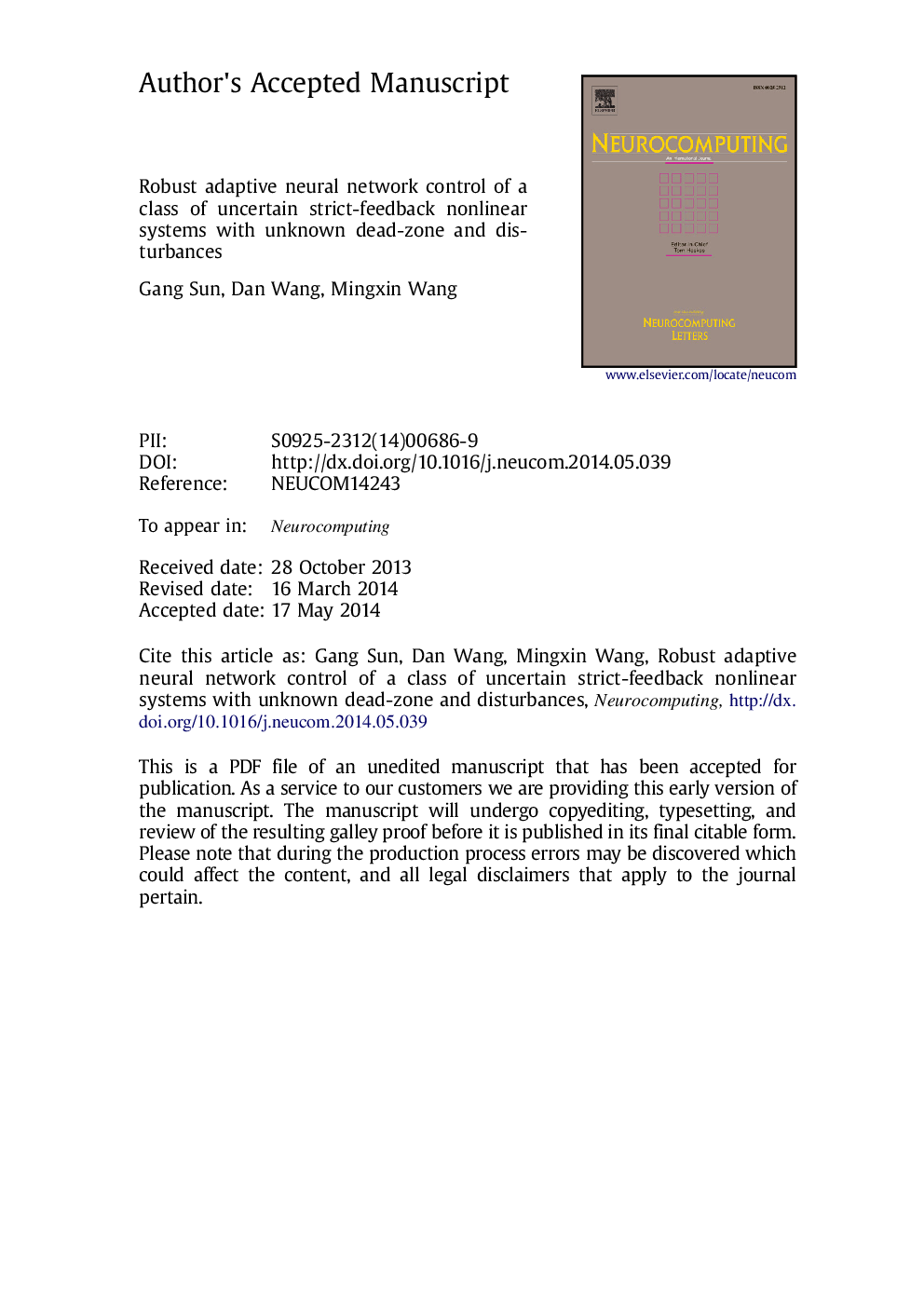| کد مقاله | کد نشریه | سال انتشار | مقاله انگلیسی | نسخه تمام متن |
|---|---|---|---|---|
| 6866383 | 678171 | 2014 | 30 صفحه PDF | دانلود رایگان |
عنوان انگلیسی مقاله ISI
Robust adaptive neural network control of a class of uncertain strict-feedback nonlinear systems with unknown dead-zone and disturbances
ترجمه فارسی عنوان
کنترل شبکه عصبی تطبیقی مقاوم در برابر یک طبقه از سیستم های نامتقارن نامشخص غیر خطی دقیق بازخورد با منطقه ناشناخته و اختلالات
دانلود مقاله + سفارش ترجمه
دانلود مقاله ISI انگلیسی
رایگان برای ایرانیان
کلمات کلیدی
کنترل تطبیقی قوی شبکه عصبی تک سیستم های غیر خطی دقیق بازخورد نامحدود منطقه مرده، اختلالات،
ترجمه چکیده
در این مقاله یک روش طراحی قوی کنترل عصبی تطبیقی برای یک کلاس از سیستم های غیرخطی سخت با بازخورد مضطرب با ناحیه ناشناخته ارائه شده است. در طراحی کنترل کننده، متفاوت از روش های موجود، تمام قوانین کنترل مجازی در مراحل متوسط اجرا نمی شود، و تنها یک قانون کنترل قوی تطبیقی قوی با تقریب تابع ناشناخته توزیع شده سیستم با یک شبکه عصبی در آخرین مرحله با استفاده از این رویکرد، ساختار کنترل طراحی شده بسیار ساده تر است، زیرا علت مشکل پیچیدگی رو به رشد در روش های موجود حذف می شود. تجزیه و تحلیل ثبات نشان می دهد که طرح پیشنهادی می تواند محدودیت نهایی همه ی سیگنال های سیستم حلقه بسته را تضمین کند و با انتخاب مناسب پارامترهای کنترل، خطای ردیابی حالت پایدار می تواند به صورت خودسرانه کوچک باشد. مطالعات شبیه سازی اثربخشی و شایستگی روش پیشنهادی را نشان می دهد.
موضوعات مرتبط
مهندسی و علوم پایه
مهندسی کامپیوتر
هوش مصنوعی
چکیده انگلیسی
In this paper, a robust adaptive neural control design approach is presented for a class of perturbed strict-feedback nonlinear systems with unknown dead-zone. In the controller design, different from existing methods, all the virtual control laws need not be actually implemented at intermediate steps, and only one actual robust adaptive control law is constructed by approximating the lumped unknown function of the system with a single neural network at the last step. By this approach, the structure of the designed controller is much simpler since the causes for the problem of complexity growing in existing methods are eliminated. Stability analysis shows that the proposed scheme can guarantee the uniform ultimate boundedness of all the closed-loop system signals, and the steady-state tracking error can be made arbitrarily small by appropriately choosing control parameters. Simulation studies demonstrate the effectiveness and merits of the proposed approach.
ناشر
Database: Elsevier - ScienceDirect (ساینس دایرکت)
Journal: Neurocomputing - Volume 145, 5 December 2014, Pages 221-229
Journal: Neurocomputing - Volume 145, 5 December 2014, Pages 221-229
نویسندگان
Gang Sun, Dan Wang, Mingxin Wang,
